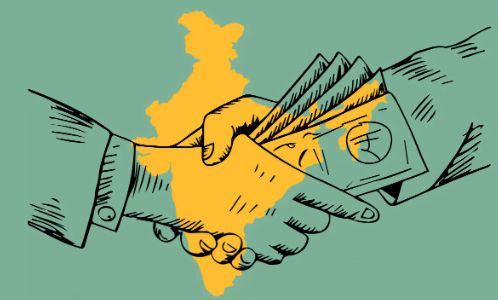Corruption is a complex social problem that affects all societies. India is no exception. It is no longer considered a soft state as political scientists once used to call it. It has now become a kleptocracy, a consideration state, where every thing to be had can be had for a consideration. Here, it is said, obvious does not happen. For example, if a person wants a government job, he/she has to pay lakhs of rupees to the higher officials irrespective of satisfying the eligi bility criteria. In every government office one has either to give money to the employee concerned or arrange for some sources to get work done. There is adulteration and duplicate weighing of products in food and civil supplies department by unscrupulous workers who cheat the consumers by playing with the health and lives of innocent people. In the assessment of property tax one has to pay bribes even if the house is built as per rules and regulations.

Political corruption is also worst in India. A newly elected independent MLA is offered crores of rupees as well as a ministership for supporting the ruling party. Today, corruption has taken the shape of such as common menace that people do not mind giving bribe even for getting a lawful work done.
Concept
Corruption is broadly defined by the World Bank to mean the use of public office for private gain. In simple terms, it may be described as "an act of bribery". It has also been described as "the use of public power for private profits in a way that constitutes a breach of law or a deviation from the norms of society
Political Corruption and Scams
It is a well-known fact that a large number of politicians not only in India but almost in all countries are corrupt. People never feel shocked when politicians' corruption is divulged. Honest politicians are a rare breed today. Corrupt politi cians not only go scot-free, unharmed and unpunished but they manage to strut on the political stage as honourable leaders. Examples of politicians like Lal Bahadur Shastri and Sardar Vallabh Bhai Patel are rare who had very little bank balance at the time of death. In this land of ours, while a thief who commits theft for feeding his hungry children after remaining unemployed for a long time is promptly put behind the bars, those who plunder the country masquerade as honourable citizens with all the paraphernalia merely because they happen to be big-wigs in politics or are close to centres of power.
Money and muscle power not only help win elections but also making politics a rather profitable affair. An analysis by the Association of decade 2001-10 shows that average assets of 62,847 candidates who have contested elections for parliament and state assemblies since 2004 were to the tune of Rs 1.37 crore and those of victorious ones Rs 3.83 crore. What is more interesting is that the wealth of legislators who faced criminal charges rose even more to Rs 4.30 crore and those with serious criminal charges like murder, kidnapping and rape were on the top of the heap with average assets of Rs 4.38 crore (Times of India, July 30, 2013).
Similarly, ADR, in its press release (July 10, 2013), revealed that a total o 1,460 (or 30%) of the total 4,807 sitting MPs and MLAs in the country have criminal cases against them and of these 688 (or 14%) have serious criminal cases. Out of the total Lok Sabha members (i.e., 543), 162 (or 30%) have criminal cases against them which include 76 cases of serious crimes. The corresponding figures for Rajya Sabha members (i.e., 232) are 40 and 16 respectively. And, in states, of the total 4,032 sitting MLAs, 1,258 (ie., 31%) have criminal against them, of which 596 (or 15%) are of serious nature.
Recently, in its landmark judgment, the Supreme Court of India had attempted to correct an anomaly in the Representation of People Act when it held that there was no reason why elected representatives should be specially protected from disqualification pending appeal when they are convicted for offences specified in the Act. Sadly, instead of recognizing this and using it as an opportunity to weed out criminal elements, the Government of India has chosen to overturn the apex court's judgment by issuing an ordinance. But, facing rising public anger and bowing to Congress Vice President Rahul Gandhi's wishes the Union Cabinet later junked the contentious ordinance/bill protecting convicted MPs/MLAs from immediate disqualification. Rashid Masood, ruling Congress leader became the first MP to be disqualified due to his conviction in a corruption case.
Corruption in Corporate Sector
The corporate sector is an important link in the vicious cycle of corruption comprising neta-babu-lala jhola-dada . India has a long tradition of entrepreneurship. The link between government and business has also a long history everywhere in the world. In any system of governance, business enter prises and their owners play a vital role. The post-liberalization period, due to market-based competition, was visualized as an era of reduced corruption. But, unfortunately, this did not happen in India; instead corruption has mutated into more vicious forms, leading to crony capitalism.
The scams of recent years again brought into sharp focus the corporate sector's role in governance. If the corporate sector is corrupt, it can corrupt other sectors easily because of its financial clout. Good corporate governance has, therefore, become a necessity. And that depends on the corporate leader- ship's ability. Not only there should be transparency in every decision- making operation but also accountability on the decision taken, that in turn means protection of the interests of both the stakeholders and shareholders.
Causes of Corruption
Number of factors have been pointed out as causes of corruption or public dishonesty. First is the emergence of political elite who believe in inter est-oriented rather than nation-oriented programmes and policies. In fact, the post-British raj (rule) has been described as the "raj of ministers and bureau- crats". The political elite in the first two decades after independence were honest, dedicated and nation-oriented to the extent that they always worked for the country's progress. Later on, particularly after the fourth general elections in 1967, such persons came to hold political power both at the Centre and in the states who worked only on the basis of some vested interest, say, interest of self, family, caste, region, party, and so forth. Their policies and programmes incidentally might have been nation-oriented but essentially they were 'interest-based'. They encouraged the bureaucrats too to follow suit. A majority of bureaucrats in our country are 'ritualists' and remain concerned more with perks and privileges than with 'development-oriented policies for the society. The politicians and bureaucrats thus started using their power and position for illegal benefits. 
Impact of Corruption
While talking of corruption, should we be concerned only with big financial deals and scams, or types of corruption called political, bureaucratic, industrial, institutional, etc., or we should also be concerned with those corruption cases which remain invisible but pervade our daily life and corrode the very Ebre of our moral fabric. Some people feel that we should filter corruption into various grades. While according to one view, 'amount' should be the criterion of corrupt act, according to other, 'need' should be the focus. A few rupees spent to gain a major benefit is not worth bothering about. Yet another view is that 'price' paid for the required 'service' is in order. Corruption comes in only when the price is paid but for which no service has been done. But what about adulteration in food or spurious drugs sold to us and things ke that? Generally, such cases in our daily life are not regarded as 'corrup tion". Is cheating in an examination corruption? Is increasing marks in an answer-book by an examiner on getting 'recommendation' from a colleague or a friend or a kin (but not by accepting money) corruption? In their defence, examiners say that they only 'oblige' and how can 'obligation' be corruption? Many clerks go to the offices and sign the attendance registers but are never found on their seats. They become available' only when they are offered money for the file they move. This is corruption
Corruption in India